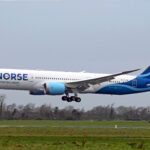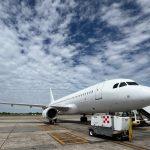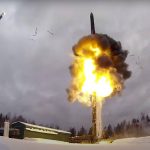Discussions between the governments of Germany, Spain and France and their respective aerospace industries on the next phase of the FCAS program have been successfully concluded.
Airbus Defence and Indra, the main companies involved in the next-generation combat air system program on the German and Spanish sides, reported on their social networks that the necessary agreements were reached between the parties to unlock the work that will allow the FCAS program to move forward to its next phase.
Airbus statement on the Future Combat Air System #FCAS pic.twitter.com/DstorIcS24
— Airbus Defence (@AirbusDefence) November 18, 2022
Indra statement on the Future Combat Air System #FCAS pic.twitter.com/FUqAKwwMxx
— Indra (@IndraCompany) November 18, 2022
Following a series of formal preliminary steps, the contract is expected to be signed soon.
German Defense Minister Christine Lambrecht pointed out the importance of the FCAS program for the future of the European air forces, as well as for the defense industry and for the strengthening of the political alliance between its partners.
„Auf dem Weg in Richtung Luftstreitkräfte der Zukunft in #Europa zeigt sich erneut, dass wir die gewaltigen Herausforderungen nur gemeinsam bewältigen können“, so Verteidigungsministerin Lambrecht. #FCAS wird die Bundeswehr als auch unsere #Partner nachhaltig stärken. pic.twitter.com/oTKBy8R2sr
— Verteidigungsministerium (@BMVg_Bundeswehr) November 18, 2022
«The political agreement on FCAS is a major step and – especially in these times – a valuable token of the excellent Franco-German-Spanish cooperation. It strengthens Europe’s military capabilities and secures important know-how for our industry, but also for the European industry.»
The end of uncertainty, or its postponement?
The tri-national FCAS program started with the establishment of a partnership between France and Germany, which required a new-generation fighter aircraft to eventually replace their Dassault Rafale and Eurofighter Typhoon beyond 2035. Spain would later join the project.
Trouble started soon after, with a ballistic exchange of mutual accusations between France and Germany, who were mutually reproaching each other for seeking to take advantage of the other. There were even rumors of dissolution of the partnership and contingency plans to pursue the goal of creating a new generation fighter alone.
All seemed to be in the past when in September 2021 the three nations agreed to fund the next step of the project, Phase 1B, which will aim to create different prototype technology demonstrators, according to the responsibility-sharing scheme established in the previous phase.

But the signing of the contracts was not happening. According to several sources, the obstacles were due to the dispute between Dassault and Airbus over the workload between the companies of both countries, but mostly over the intellectual property rights that would be generated and the technology transfer that must necessarily take place between the partners to be able to work together on the development of the FCAS.
However, now it seems that all parties were able to reach an agreement on these burning issues and the future tri-national air combat system will be able to advance one more step forward.
However, it should also be noted that it has been a few hours since the announcement by Airbus and Indra and at the time of writing, there is still no communication from the French Government or Dassault Aviation. It may not be all peace and harmony from now on, and for Phase 2 the partners will have to return to heated discussions on the best way forward.














